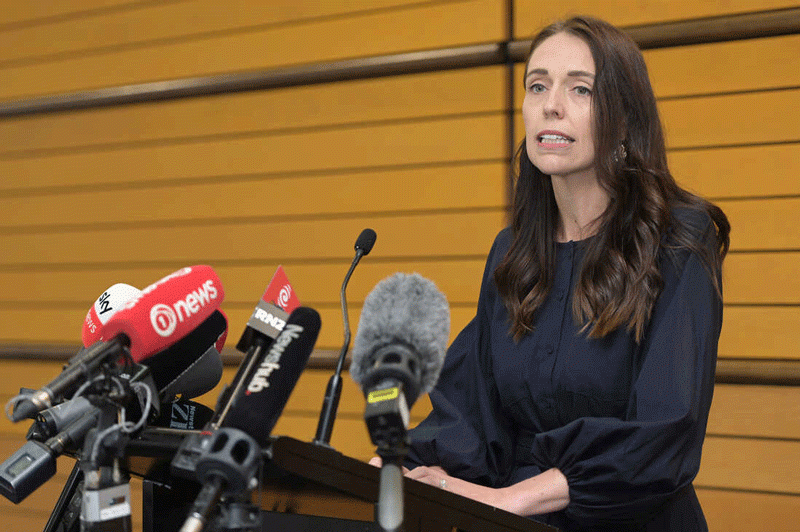
New Zealand Prime Minister Jacinda Ardern made a shock announcement she had "no more in the tank" to continue leading the country and would step down no later than early February and not seek re-election.
Ardern, holding back tears, said that it had been a tough five and a half years as prime minister and that she was only human and needed to step aside.
"This summer, I had hoped to find a way to prepare for not just another year, but another term - because that is what this year requires. I have not been able to do that," Ardern, 42, told a news conference.
"I know there will be much discussion in the aftermath of this decision as to what the so called 'real' reason was... The only interesting angle you will find is that after going on six years of some big challenges, that I am human," she continued. "Politicians are human. We give all that we can, for as long as we can, and then it's time. And for me, it’s time."
A ruling New Zealand Labour Party vote for a new leader will take place on Sunday; the party leader will be prime minister until the next general election. Ardern's term as leader will conclude no later than Feb. 7 and a general election will be held on Oct. 14.
Ardern said she believed Labour would win the upcoming election.
New Zealand Deputy Prime Minister Grant Robertson, who also serves as finance minister, said in a statement he would not seek to stand as the next Labour leader.
Ardern's successor as party leader and prime minister faces a stern test in a general election, with support for Labour falling and the country expected to go into a recession next quarter.
- Mnangagwa backers hound church leaders
- School of sport: Where is school sport going?
- Govt outfoxes opposition on reforms
- Celebrating Zim beef sector
Keep Reading
A 1News-Kantar poll released in December had Labour polling at 33%, down from 40% at the start of 2022. That means that even with traditional coalition partner the Green Party, polling at 9%, Labour could not hold a majority.
Commentators point to several of Ardern’s ministers as possibilities for the role, including the former COVID minister and current Minister of Education and Police Chris Hipkins and current Minister of Justice Kiri Allen.
FAMILY TIMEArdern said she was not stepping down because the job was hard, but because she believed others could do a better job.
She made a point of telling her daughter Neve that she was looking forward to being there when she started school this year and told her longtime partner Clarke Gayford that it was time they married.
Riding a wave of "Jacinda-mania," she campaigned passionately for women's rights, and an end to child poverty and economic inequality in the country.
Eight months after becoming premier she became the second elected leader to give birth while in office, after Pakistan's Benazir Bhutto. Many saw Ardern as part of wave of progressive female leaders, including Finnish Prime Minister Sanna Marin.
Her empathetic leadership style was cemented by her response to the mass shootings at two mosques in Christchurch in 2019 that killed 51 people injured 40.
"Her universal call for human unity with compassion made me cry with joy then, and it makes me cry now," said Farid Ahmed, survivor and husband of a Christchurch attack victim.
"Her kindness, wisdom and efforts for a peaceful world have been a remarkable example for world leaders," he said. "I understand that she needs rest, and I wish her all the best in her life."
Ardern swiftly labelled the attacks “terrorism” and wore a hijab as she met with the Muslim community a day after the attack, telling them the whole country was “united in grief”. She promised and delivered major gun law reform within a month.
"Jacinda Ardern has shown the world how to lead with intellect and strength. She has demonstrated that empathy and insight are powerful leadership qualities," Australian Prime Minister Anthony Albanese said on Thursday.
CHANCE FOR LABOUR TO REFRESHArdern won plaudits across the political spectrum for her handling of the COVID-19 pandemic, which saw the country face some of the strictest measures globally but also resulted in one of the lowest death tolls.
But her popularity has waned over the past year as inflation has risen to nearly three-decade highs, the central bank has aggressively increased the cash rate and crime has risen.
The country has become increasingly politically divided over issues such as a government overhaul of water infrastructure, and the introduction of an agricultural emissions programme. Ardern and Labour have seen their opinion poll support suffer.
Political commentators say Ardern's departure will bolster the opposition conservative National Party, but also could give Labour a chance to refresh and reposition itself ahead of the election.
"There is a potential for a Labour leader to come in and kind of reset the Labour Party to a party that's focused on the issues that voters are focused on - cost of living, inflation and making sure that wage earners get more of their share of the wealth," said Josie Pagani, a former Labour candidate.







